Human Action Principles
February 26th, 1995
Lecture Number Five
Ladies and gentlemen, this will be a good test of your stamina. It is not easy to sit through an entire day at a seminar in a lecture. The only thing I can say is that if you’re able to maintain your concentration, you will get a lot of value out of this session, more value than you’ll get if you kind of fade away. And, at any time, you are more than welcome, encouraged, if you get a little groggy or whatever, to go outside and take a swig of coffee or something out there in the foyer area because that’s better than just tuning out.
The law of human action tells us we’re all after satisfaction. Nature commands you to seek greater satisfaction. Nature doesn’t give you one clue as to how to get it. What are your options in this regard? You can guess at the means. You can follow established opinion, you can follow popular superstition, or you can reject all of these and apply a scientific approach to the identification of the true means. And that’s exactly what we’re going to do here. We’re going to have, I think, some fun doing it. At the conclusion of an earlier session I made this bold claim: Optimization Theory demonstrates the true means for the optimization of the greatest good for the greatest number.
Prior to this time I don’t know of anyone who has even proposed this as a scientific goal. And since the very subject of science sounds pretty heavy to most people, and even awesome, let’s look again at the goal of science. The goal of science is to know reality. Sometimes we can communicate a concept more effectively by using common street language – the goal of science is to find out what the hell is going on. My friends, there is only one way to find out. There aren’t twelve ways, not three – one.
We must acquire a correct understanding of the causes of things. Especially what? The things you like and the things you dislike. To know reality means to acquire a correct understanding of the causes, as I said, of the effects that you like and the causes of the effects that you dislike. The causes of these things are, in general, hidden from view. The problem becomes how to discover these hidden causes in order that reality is no longer hidden from view.
A problem can be solved by turning to science, but science is not for everyone, of course. The methods of science reveal reality only to those whose curiosity compels them to see. If you are compelled to understand reality, then you are in sharp contrast with most of your fellow humans. And why do you think there are so few who are truly excited about understanding the cause of anything? Why so few? Because the benefits to be gained are also hidden from view. Where’s my benefit? Now, I want it now, now, I’ve got to have it now. Yesterday would be better. I want it now. Who thinks like this? Almost everybody you know.
One of those hidden benefits is this. Each time you add to your understanding of the causes of things, you also add to your self-esteem. In other words, you like yourself better. Hey, that’s always good, if you can like yourself better, that’s always good. When you use science as a searchlight to view the reality of human action, you will see reality in a new light. The impact upon you, I hope, will be exhilarating.
All of you know the benefit of having a life filled with exhilaration. Life without exhilaration is a very dull life. Therefore, you can never experience too much exhilaration. You can never have too much passion for an understanding of what the hell is going on.
With this in mind, I have this question for you, which will set the scene for this lecture five. Namely, is there anything that happened before you were born, the cause of which is essential for you to understand? And if the answer is yes, then what do you think that might be? As you know, humans have been keeping records of their actions for – how long have we been keeping records of human action? Usually we hear that 6,000-year figure, and I won’t argue with that one.
And there was also, and this should come as no surprise to you, there was also a lot going on before our ancient ancestors kept any records of their actions. We call that period pre-recorded history, pre-records.
And so we have all of this pre-recorded history. This was before the invention of that landmark achievement known as writing. Now, for us today many of the earliest written languages are impossible to read. Many of these now dead languages have not been written or spoken for thousands of years. By the time we arrived thousands of years later, what was writing to these ancient people is unintelligible to us.
For centuries, language scholars have tried to decipher these ancient writings. The most famous of these scholars is the language technologist, Jean-Francois Champollion. Champollion, using the famous Rosetta Stone that you’ve all heard of as his guide, was able to finally decipher the language of the ancient Egyptians. His discovery amazed and delighted everyone interested in the ancient Egyptian civilization. What did Champollion do that was such a big deal, especially if you’re interested in the history of Egypt, which had a long, long history?

It’s very important. Champollion discovered that the Egyptian writings, known as hieroglyphics, were much more than pictorial symbols telling a story. Do you know what he discovered? These symbols turned out to be characters that made up a phonetic language that could be read, pronounced, and understood which is pretty important if you care about the ancient Egyptians, right? Now we can read their language.
Champollion, the language technologist, opened the door to our understanding of the mysteries of the Egyptian civilization. And so, from hieroglyphics we learned more about the causes of things Egyptian. For the historians of ancient civilizations, all of this is fascinating. But we need know nothing about it to save our civilization from destruction. What was man doing before he kept any records of what he was doing?
Two important technologists have helped us understand the scope of human action in pre-recorded history. You’ve heard of them: the archeologist and the anthropologist. They have unlocked some of the mysteries surrounding the origin of the human race. But in order to solve these seven problems that I keep alluding to, there is not one thing you have to know about human action and human events that took place before we kept any records of it.
There is nothing that has been more glorified, analyzed and criticized by historians than war and its consequences. We don’t have to understand anything, for example, about the wars between the Roman Empire and the Carthaginian Empire known as Punic War I, Punic War II, and Punic War III. Who’s willing to admit that he kind of gets sometimes mixed up, Punic War II with Punic War III, or even Punic War I? Any of you? Sometimes you can’t separate those too well?
If you have studied these wars, you may recall that the word Punic refers to what? Punic refers to Phoenician. In the 9th century BC, the Phoenicians founded the magnificent city of Carthage in North Africa. And for those of you who have studied the ancient history of Mediterranean cultures, which is fascinating, here is an easy question for you.
What did the Phoenicians from the Eastern Mediterranean give us, some 3,000 years ago, that is essential to our greater understanding of the causes of things?
It turns out the language you speak with, read with, and write with, and most importantly think with, comes to you courtesy of the Phoenicians. English is largely derived from Latin and Greek, and Latin and Greek are derived from Phoenician. The Phoenicians gave the Greeks and Romans their alphabets. All Western language alphabets are Phoenician.
For some people all of this history is fascinating. But to bring these seven crisis problems to an end, you don’t have to know one thing about dead languages or prehistoric men, or Egyptian culture, or the generals who fought in ancient wars, or who won the wars. Again, the question of the hour is this: is there any human event that took place before you were born that is essential for you to gain a scientific understanding of its causes and effects? Essential in this case means necessary to your survival and the survival of your friends and loved ones and all of civilization.
It turns out there is one thing that happened before you were born of which you must gain a scientific understanding. If you and other key people fail to gain a rational perspective of the significance of this event, the entire human race will perish from the earth. We will be just as extinct as a dinosaur.
Now, who is willing to say he doesn’t have the foggiest idea what historical event I’m talking about? Who thinks he knows? Scientific method? Anyone else? We have an answer of the scientific method. We have an answer of religion. Anyone else? If we do not understand this event from a scientific perspective, we will probably perish as a species. The yellow fever incident, okay, that’s not bad, which yellow fever incident were you referring to?
Okay, let me ask you this: who doesn’t care what historical event I’m talking about? This event has been named by historians as the industrial revolution. What was this revolution in industry all about? In a few words, it involved the widespread turnaround – revolution – in industry from hand-driven tools to power-driven tools. As you know, power-driven tools are more efficient and effective than hand-driven tools because they produce more products and usually, and people miss this, usually better products, in less time. You don’t want a hand-made television set – it isn’t too good. If you make every part yourself, it isn’t too good.
Historians have commonly designated the time of the industrial revolution as roughly the century starting around 1750, concluding around 1850. These writers of history have given us this picture of the industrial revolution. They usually begin with a description of social conditions in Great Britain on the eve of the industrial revolution. Prior to the beginning of this revolution in industry, the common man is portrayed as living a simple, peaceful, charming existence in the rustic countryside of merry old England.
We are told that the economic and social conditions of the time were by and large satisfactory. The peasants were happy, the industrial workers who for the most part worked in their own little cottages and enjoyed the benefits of a certain amount of economic independence. They owned a garden plot, perhaps, and some of their own tools.
Well, this has been the historical view of the good life as it existed in England, just before the industrial revolution. But then what do the historians claim happened to this good life? Two of the more influential historians of this century have been the English authors, John L. Hammond and his wife, Barbara Hammond. In their 1919 publication of The Skilled Labor, they tell us in one sentence what happened to the good life of the common man. They said, quote, “The industrial revolution fell like a war or a plague upon the people.”
Now, their story is a familiar story told of cause and effect describing the industrial revolution. We are told it was the factory system that reduced the once free, happy worker to a condition of virtual slavery. The revolution in industry, it is said, lowered the workers’ standard of living to a level of bare subsistence. The revolution kept him a few mouthfuls ahead of starvation. It crammed women and children into the factories. The factory system destroyed family life and eroded the moral foundations of society. The revolution, it is said, diminished the quality of the workers’ health.
And so the historians claim to know what caused the destruction of this pastoral life of the once happy English peasant. We are told that the factory owners and entrepreneurs ruthlessly exploited the workers. These entrepreneurs cleverly imposed the yoke of slavery upon the shoulders of their workers. Finally, the historians tell us, that in time the workers and their families were rescued from this misery by the paternal benevolence of politicians and their bureaucratic administrators.
Ladies and gentlemen, it is imperative that we apply the methods of science to answer this question: is the historians’ portrait of the industrial revolution an accurate description of the reality of this profound revolutionary event? Is all of it true, is none of it true, or is only some of it true?
First of all, what people have believed the historians’ interpretation of the evils of the industrial revolution? It is believed by almost everyone who has attended high schools, colleges, and universities. Please note that includes everyone you know unless you do know some people who didn’t even attend high school. It’s believed by almost all entrepreneurs, proprietors, and businessmen who attended these schools.
Where do almost all people acquire their beliefs concerning the causes of things that happened before they were born? They get most of these beliefs directly from history books and history courses, and indirectly from writers of plays, novels, magazines, newspaper articles, and so forth, who have themselves read history books and taken history courses.
How many of these students who attended history classes and read history texts, at the time, ever evaluated the quality of the historians’ interpretation of history? How many? Does the question answer itself? Was the historians’ interpretation any good? On what basis can the student at any level of schooling differentiate between a good interpretation and a bad interpretation of history? How can a student evaluate an interpreter’s interpretation of anything on any subject?
Students are given little, if any, scientific knowledge on how to evaluate the quality of doctrines in the first place. Students are not given a scientific criterion or standard of true doctrines versus false doctrines. Where the prime focus of the student has been upon grades, diplomas, and degrees, nearly all such students embrace those doctrines advanced by their indoctrinators. Whether this historic approach to education is of itself good or bad, desirable or undesirable, is not even an issue. My only point here is that teaching students how to apply the methods of science to evaluate the quality of their textbooks and the quality of the doctrines they are taught has rarely, if ever, been the primary focus of any traditional schools.
Well, by this time you may have guessed that I am about to give you the basis of a new paradigm, a new model, a new view of the reality of the industrial revolution. And why is this so crucial? Here is why: without a scientific analysis of the industrial revolution leading to a historical revision of the misinterpretation and misrepresentation of that revolution, it will be nearly impossible to optimize world peace, prosperity, and freedom – probably impossible to do it. If you don’t get the industrial revolution on a rational perspective, as I said earlier, the whole species may go down the toilet – self-flushed.
If you want to understand what’s going on, you must arm yourself with scientific principles – there is no other way to do it. Let’s see if we can discover some principles that will give us a scientific perspective of the industrial revolution. Let’s start with this question: what were the economic conditions in England on the eve of the industrial revolution? Before the industrial revolution, if you were a common man, do you have relative prosperity or relative poverty in England? The identification of just one principle that was in operation at the time tells everything.
The English people prior to the industrial revolution were producing babies at a much faster rate than they were producing tools of production. Does that tell you anything? That is the application of a principle. When you’re producing babies faster than tools, you’re applying a principle. And what do we call that principle? The principle of poverty. Please note, my friends, it doesn’t matter where you produce babies faster than tools. It can be in China or India or even England and the effect is always the same: Poverty.
What I will now identify is why England was in the grip of poverty before the industrial revolution, when it could have enjoyed relative prosperity. If you’ve studied English history you will remember the British Corn Laws. What an Englishman calls corn, I should point out, an American calls wheat. And what a farmer in Scotland calls corn, a farmer in Kansas calls oats. What a European calls corn, an American calls rye. Confusing, isn’t it? What an American calls corn is neither wheat nor corn nor rye, but is Indian maize or a hybrid thereof.
Well, the British Corn Laws went on from 1436 to 1846. They were imposed upon the British people for 410 years. Finally, they were repealed in 1846. The law said essentially this: If you, sir, are a producer of grain, you cannot sell your grain to anyone who wants to buy it. In fact, you cannot sell your grain to anyone who lives beyond the nearest town market. If you violate this law, you will be fined, or all of your produce will be confiscated, or you will be imprisoned, or all of these.
The Corn Laws represent the first illustration, in this seminar, of what is known as interventionism. Now, since the Corn Laws represent an act of British interventionism, let’s define the term interventionism. This will be one of the probably half a dozen most important definitions in the seminar. Here is a precise definition of Interventionism.

Now I’ll be going over these definitions again and again, and giving you examples, but we have to start somewhere.
All of the features of the Corn Laws required interventionism in order to impose these laws upon the people. Whenever any government controls the production, distribution, and consumption of any product, by definition this always involves interventionism. However, please note there is no presupposition given here that says, or even implies, that interventionism per se is either moral or immoral, right or wrong. I have not said this. I’ve just defined it. I haven’t said it’s good or bad. What we will examine, however, are the effects of the British government’s acts of interventionism. What are the effects, and, most important, are the effects progressive or regressive? Does the interventionism carry the British people forward or backward?
Well, one of the most common results or effects from the interventionism of the Corn Laws was to produce in one area of Britain a surplus of corn, and in another area a scarcity of corn. These dramatic differences, for example, in the yield of both quality and quantity from one area to the next, is easy to understand. Even with today’s advanced technology in farming, the success of a given crop is still very much dependent upon weather phenomena.
Where, for example, there is irrigation technology, it may unexpectedly rain at the wrong time. Can this happen? It happens all the time. It may not be possible to harvest the crops during a rain or while they’re still wet. By the time they can be harvested they may be ruined due to over-ripeness, or mildew, or what have you.
Where irrigation is unavailable, drought may destroy the crops. Crops may be destroyed by, you name it: hail, frost, many other destructive weather conditions. Even where the weather is perfect, a bumper crop may be consumed by an army of herbivorous insects. Does this happen? All the time.
But in England, at the time of the Corn Laws, they didn’t even have irrigation technology, chemical fertilizers, or pesticides. They didn’t even have weather forecasts. The result was a far greater variation between the crop success in one region compared to another, as you can imagine. You could literally have feast in one region and famine in the next.
Furthermore, there was no food preservation technology to minimize the sharp variations in production from one year to the next. The technology of canning food, freezing food, refrigerating food, and chemically preserving food, all of this was to come later.
Now, if you are an English farmer, what does this mean to you? Well, because you can only sell your grain in the nearest market town, the government interventionists have sharply reduced the potential size of your market. If you improve your efficiency at producing grain, you will glut the local market, which is your only market. You cannot earn a profit on a surplus you’re not allowed to sell. Does that make sense?
And so the interventionism confiscates your incentive to improve your methods of production. The confiscation of incentive is especially destructive because if you’re not the victim of the confiscation, it’s hard to see all of this. Let’s look at five regressive effects caused by this government interventionism known as just the Corn Laws.
This interventionism, the Corn Laws, retarded accumulation of the quantity and quality of the tools of farm production. A law of regressive human action tells us the Corn Laws are regressive. The government confiscated the farmers’ incentive to accumulate more and better tools. Where there are no profits to be gained by improving the quantity and quality of tools, there will be no improvement. Surprise? No, you’re not surprised.
Remember, a regressive human action decelerates the growth of more and better tools for the production of goods and services. The interventionism of the Corn Laws greatly lowered the output of farm production. The interventionism of the Corn Laws greatly lowered the standard of living of the English workers on the farms and in the factories. These laws lowered the standard of living, especially of the common people.
What other injury did the Corn Laws unleash upon the people? This interventionism restricted the opportunity for new employment in the farm industry. The Corn Laws further aggravated a growing unemployment problem. This interventionism retarded progress in transportation technology. And so, by preventing the exportation of grains to the continent of Europe, the Corn Laws retarded the development of a more advanced transportation technology.
All right, I have this question. You probably were wondering if I was ever going to ask this question, and that is: what can you learn from four centuries of British Corn Laws? I’ll illustrate a principle from this example of the Corn Laws that you can use indefinitely to understand causality. I call this the principle of retrogressive or regressive domino effects.
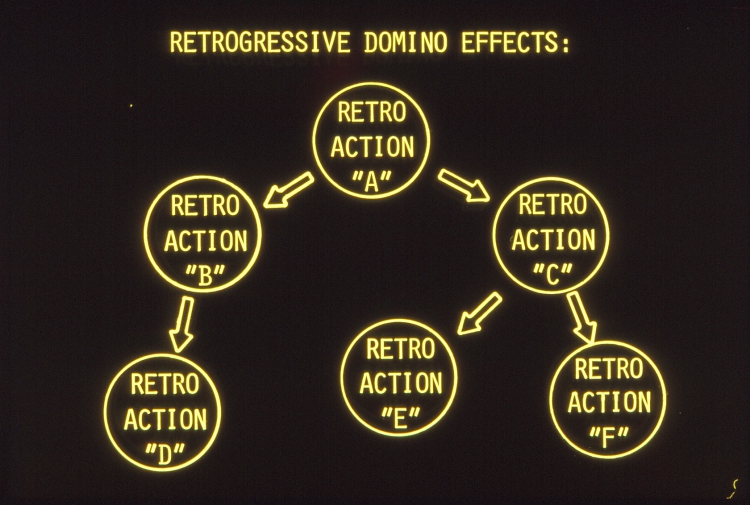
As a child, I presume all of you played with dominoes. Right, as a kid, dominoes, anyone? Did not play with dominoes? If anyone did not play with dominoes, I want to see you right after the session. And so you played with these dominoes, you set them up on end in a long line, each domino within striking distance of the next. Then you knocked down the first domino, which in turn strikes the second and the third, and finally, one by one, they all fell. Right? You’ve done this? And there are adults who do this now – they spend weeks, months, on elaborate domino systems, and then they all fall down, one by one.
In a like manner, when an individual executes a specific regressive human action, the regressive effects will not end with the first action. Here is what happens. We have retrogressive action A, that produces retrogressive action B, which produces retrogressive action D. Or regressive action A produces regressive action C, which produces regressive action F and so on.
In later sessions I will give you examples of the principle of progressive domino effects. And guess what? We reverse the principle when we have progressive action A, which produces progressive action B, which produces D, and so on. A produces C, and that produces F, and so forth.

Let’s look at another regressive effect the British Corn Laws had upon the common people. The British bureaucracy confiscated the people’s freedom to buy and sell products of their choice. Every time the British bureaucracy confiscated the consumer’s choice, at the same time it also confiscated the consumer’s level of satisfaction. Confiscate your choice; confiscate your level of satisfaction.
How can you be certain that it did all this? Because now that we have laws and principles, the law of human action tells us that every consumer is in pursuit of a product to increase his level of satisfaction. British bureaucratic interventionism was not limited to imposing the Corn Laws upon the British people. In addition, the merchant guilds and the craft guilds were government imposed monopolies for the practice of a specific trade or craft within a defined geographical area – they had these monopolies. If you were not a member of the guild, the government would prevent you from producing the monopolized products.
This restricted the production of products far below the consumer demands for products. And so through this interventionism, the bureaucracy was again confiscating the consumers’ choices of what to buy and the sellers’ choices of what to sell. What was the result of all of this bureaucratic interventionism? Another regressive domino effect. Fewer products per consumer always causes a lower standard of living for the people.
Furthermore, the British government gave the guilds the authority to set wage rates, hours of work, and terms of apprenticeship. In that sense, the guilds became an extension of the British bureaucracy. The guilds were unwilling to accept the free choice of the consumers to buy a product of their choice, produced by the producer of their choice. Instead, the guilds wanted special privilege for themselves to be imposed upon the people by the heavy hand of the British government.
Another regressive domino effect of all of this was that the British bureaucracy destroyed opportunity for new employment by enforcing the guilds’ monopolies. And so the entire business structure was based upon the bureaucracy granting special privilege to a favored few. They granted special licenses and special monopolistic patents. The whole idea was to protect a few special privileged producers from competition, as we will see as we discuss this in the future. It was to protect them from the competition of more competent, efficient producers.
But what they failed to understand was causality, especially as it applies to prosperity. The business philosophy was based upon the belief that prosperity comes from the restriction of or the prohibition of all competition, both foreign and domestic. The effect of this philosophy was a rigid system of government control over all business. The result of all of this bureaucratic interventionism was a regressive domino effect that has gone virtually unnoticed.
Please note; here is what happened. The British government was responsible for imposing upon the English people a rigid caste system. It was a caste system that excluded a rapidly growing segment of the population from becoming productive. These wretched people were literally outcasts from society, excluded by the coercive hand of the British government and its bureaucracy.
The majority of these impoverished people lived off the crumbs tossed to them by the established castes. During the harvest season, some of the more fortunate people earned a trifle by laboring on the farms. Large numbers of these outcasts depended upon charity. Many thousands of the young men among these outcasts were captured by press gangs and thrown against their will into the military service, into the royal army, and the royal navy. Thousands of them perished from the hardship and brutality of military discipline. Others were killed in action. Thousands of other outcasts became robbers, thieves, beggars, and tramps, infesting the cities, towns, and the countryside.
The number of these outcasts from society was growing at a rapid rate, but the British authorities were at a loss as to how to solve the problem. Their only solution was to establish more poor houses and more work houses. The British government, however – and the historians have overlooked this – was the cause of the very problem it was attempting to solve. Their failure to understand the causes of things was due in part to their belief in an ideology of business and commerce that dominated European thinking during the 16th and 17th centuries, known as mercantilism. It was based upon the belief that the gain of one man or of one nation must always result in the loss of another.
Well, that kind of sounds like what we would today call what? A win-lose philosophy. The business philosophy of the time was one man’s gain is another man’s loss, one nation’s gain is another nation’s loss. Following this philosophy, the British government imposed all kinds of trade restrictions and regulations upon the business and commercial activities within Great Britain.
The government supported the resentment against the introduction of new inventions, new machinery, and the accumulation of the tools of production. For all of these reasons, there was little accumulation of the tools of production. Investment funds for the construction of new machinery were seldom available and, when they were, the cost of credit was extremely high.
The consequences of all of these acts of interventionism on the part of the British government introduced another regressive domino effect. For this, and other reasons I have given you, there was another class of outcasts from the system. The people who were outcasts from the British system of mercantilism were, guess what? The entrepreneurs, technologists, and investors!
They were almost totally excluded as a result of the overwhelming amount of bureaucratic regulation upon virtually all business activities. They, too, were victims of a rigid caste system. And like all caste systems, the only way you can enter the ranks of the privileged caste is how? You have to be born into the system. You have to born into your caste.
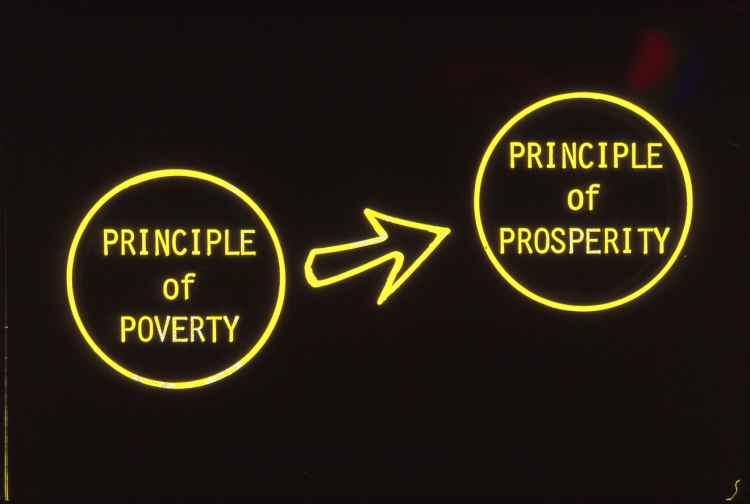
Without realizing it, the British authorities were applying a principle of human action. Guess what principle they were applying? You got it: the principle of poverty. Like all principles, it worked. Whenever and wherever you apply the principle of poverty you will get the expansion of poverty without fail. It will work just as well in England as it does in India, or wherever you try it.
The most critical question we must answer is what finally caused the factories in England to prosper? Because you see, in England one of the most remarkable turnarounds in history took place. You cannot experience a more dramatic social revolution. Something very big happened in England and it was the first place it ever happened, at least on a major basis. The British started applying, for the first time in a big way anywhere, a principle, the principle of prosperity.
It was the first time the principle of prosperity was ever applied in a large, significant way. It generated a level of prosperity for the English people, and especially the common people, that had never been equaled or even approached. The transition from the application of the principle of poverty to the principle of prosperity was accomplished by a fairly rapid acceptance of some new ideas. There was the development of, and the teaching of, an entirely new social philosophy.
The men who developed this social philosophy I will refer to as the classical economists. They were the founders of the entire social technology called economics. I call them classical economists because their views on economics are entirely different from almost all of the economists of the 20th century, with very few exceptions. The views of virtually all modern economists are diametrically opposed to those people who created the subject of economics, with only a few exceptions.
In the process of inventing the subject of economics, the classical economists refuted the mercantile philosophy that prosperity comes from the government granting special privilege to a favored few producers. Historically, this was the first intellectual attack upon the concept of special privilege.
The classical economists showed that government-imposed trade restrictions always harm both parties who are trading. They explained this for the first time. They refuted the mercantile trade philosophy that the gain of one nation can only come through the loss of another nation.
The classical economists exploded the superstitious myth that machinery causes unemployment. This removed much of the prejudices against the accumulation of more and better tools of production. The classical economists paved the way for the dramatic reduction of bureaucratic interference with the only three progressive classes: entrepreneurs, technologists, and investors.
The classical economists were the pioneers who made it possible for entrepreneurs, technologists, and investors to apply for the first time what principle? The principle of prosperity. This was the first time in history there was any large, significant application of this principle. And how did the principle of prosperity finally get launched on a grand scale? Classical economists swept away most of the bureaucratic interventionism that had prevented the application of the principle of prosperity in the first place. Where the super-humanitarians flourish, everyone flourishes, because that is where the principle of prosperity is in full operation.
Then the entrepreneurs made a very large discovery. It’s one of those great discoveries that is so simplex almost everyone misses its significance. If it’s really big and really simple and really simplex, most intelligent people miss it. The unintelligent never get it. It is this: If you want to achieve great productive success, don’t consume all of your profits as they are earned. Instead, keep plowing most of those profits back into the business in order to accumulate more and more tools of production.
Here was the secret behind the production of higher and higher quality products at lower and lower prices. When you accomplish this goal, you are literally manufacturing prosperity for whom? Everyone. Remember, prosperity does not exist in nature, it has to be manufactured.
There was another important factor that attenuated opposition to progress and innovation within the factories. The bureaucratic authorities and the ruling aristocracy were confronted with an embarrassing problem, a problem that had grown too large to solve and too large to hide. Many of them asked, what are we going to do about the rapidly growing masses of paupers who have no means of earning a living? The poor-houses are crammed to the rafters. The work houses are overcrowded. Our prisons are filled to capacity. We have a nation of beggars. What can we do?
The factories provided the solution, by doing what? By giving these masses of paupers an opportunity to become producers of consumer products. The factories emptied the poor houses, they emptied the work houses, and most interestingly, they emptied most of the prisons. Here is what happened in a few words: the factories literally converted a nation of impoverished commoners and beggars into a nation of self-supporting breadwinners.
My friends, think of it for a moment, what it means for a man to go from a prison where he is a slave to a factory where he is a free man. Do you think that’s a big improvement or would you rather stay in prison? This is a remarkable improvement, is it not; a remarkable improvement in the quality of his lifestyle. Please note, to go from beggar to producer is a major improvement in lifestyle. To go from slave to free man is another major improvement in your lifestyle.
Here is another major point almost everyone has missed. The factory entrepreneurs never compelled one person to take a job in any factory anywhere at any time in England. There is no record of this ever happening. They hired those people who were both willing and able to work for wages offered to them. Today, of course, it’s common for people to claim that the factory owners abused the factory workers by paying them low wages. But seldom does anyone present a rational answer to this claim.
During an earlier lecture I posed a question similar to this. What is the difference between the England of, let’s say, 1795, and the England of 1995? What’s the difference? The answer was what? Do you remember? I didn’t use England as an example but you can generalize. What’s the main difference between the England of 1795 and the England of 1995? Exactly, one prime difference: two centuries of the accumulation of the tools of production. That’s the difference. That’s it! Every other difference pales by comparison.
Two hundred years of accumulating the tools of production per worker. The English standard of living today is only higher because of that two-hundred-year accumulation of tools. Two hundred years ago, the entrepreneurs were just starting to accumulate the tools of production. Therefore, today we call the wage rates of two hundred years ago low. But by the standards then, guess what? To these paupers, these were immensely high wages, especially to a former prisoner. Do you think the wages were viewed as high?
Their earnings were much higher than they could possibly have earned in any other field of employment open to them. But before that, because of the caste system there was hardly any employment open to anyone. The law of human action tells us that if they could have found greater satisfaction in employment elsewhere, what would they have done? They would have taken it. Wouldn’t you?
I have this important question for you. It is this: how is a man harmed when his position is dramatically improved over anything he has ever known? The question answers itself. But in sharp contrast to the view I’m giving you, what about the much-berated circumstances of the women and children in these factories?
Dear friends, it is a gross distortion of the facts to claim that the factory employers carried off the housewives from their nurseries and kitchens, and the children from their playrooms. These women did not even possess what could be called a kitchen or a nursery in the first place. At this time, kitchens and nurseries were the luxuries available to only the wealthy. Furthermore, a kitchen only has utility when there is food to prepare in it. Does that follow?
Due to the interventionism of the British bureaucracy with the production of food – recall the interventionism of the British Corn Laws – there was very little food available with which these women could feed their starving children. The children were destitute. Their parents were destitute. Where you find destitute parents, don’t be surprised if you find destitute children.
But in their place and time there was a great change taking place. It was such a big change we call it a revolution, a technological revolution that would save them from certain death and starvation. It became a single source of refuge for these people. That source of refuge has a name, it is called the factory.
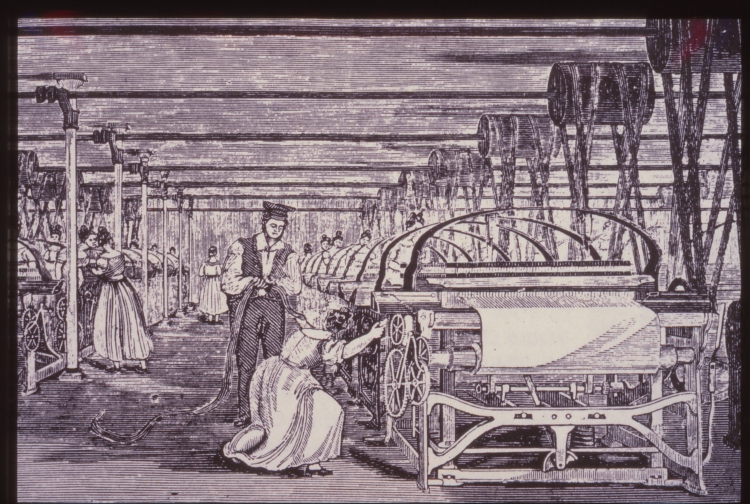
What you see here is one of these early factories. This, in fact, is the second and most important factory in history. This is Arkwright’s cotton mill. The machinery in this mill was powered by engines. Engines! Is that a big deal? This was the first mass production factory to have engine-powered, engine-driven machinery.
Richard Arkwright was the entrepreneur and technologist who invented machinery that made, for the first time, the mass-production of cloth. He introduced for example, what is called cotton calico, or just calico. In other words: an all-cotton fabric. Well, this factory, Arkwright’s factory in England, is a tool that houses the tools of product production.
Would anyone in the seminar be interested in seeing a picture of the most important factory in history? Would anyone like to see that? One person, thank you. I now give you the most important factory in history.
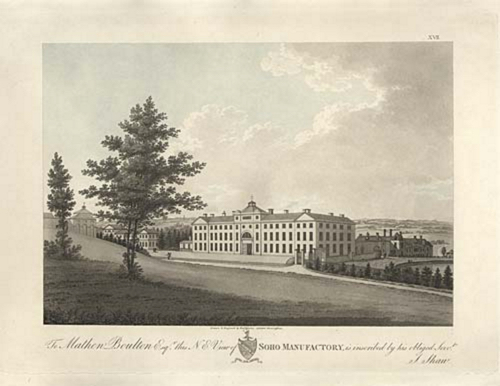
This was the Soho factory in Birmingham, England. It was founded by the most important entrepreneurial partnership in history. The partnership was between Matthew Boulton, which few of you have heard of, and James Watt, which all of you have heard of.
This was the first factory built for the purpose of building engines. The engines were designed by James Watt. It was out of this factory that the first engines were built that were to power the industrial revolution. And, as a matter of fact, the people who worked in this factory were proud of it because to them it was like working in a palace. “We go to our palace every day and we produce.” To be sure, measured by today’s standards, the economic and social conditions of these early factory workers would be called deplorable. But it’s a great distortion of historical fact to blame these early factory entrepreneurs for conditions they most definitely did not create.
These entrepreneurs were not the authors of poverty. They were not the authors of destitution. What were they the authors of? You got it: prosperity. What’s wrong with that? There must be something pretty evil about this prosperity stuff, right? Otherwise why would it be denounced? The entrepreneurs played an active role in the eradication of the social evils that they inherited. The principle social evil they inherited was wall-to-wall poverty, squalor, penury, destitution, and privation.
This does not mean that the early industrialists were altruists. A point that almost all historians have missed is that the social conditions we today consider so miserable were caused by the economic interventionism of the pre-industrial era. It is this pre-industrial era that is nostalgically referred to by writers and historians as the good old days.
Dear friends, the myth of the good old days is further propagated by the fact that for all of us, distance lends enchantment. It is quite a natural thing for us to evaluate the conditions of people living at an earlier time by the standards of our own conditions today. What were the conditions of factory life during the early days of the industrial revolution?
The standard of living of the factory workers was shockingly poor compared with the then conditions of the upper classes at that time, or with the conditions, let’s say, of the present day industrial worker. The hours of work were long, and the sanitary conditions of the workshops were deplorable. But let me ask you this: is there anything wrong with our concern today for the sanitary conditions of these early factories, and why wasn’t there better sanitation? Is there anything wrong with this today, even asking the question?
My friends, the entire concept of sanitation was not even understood until a hundred years later, when Louis Pasteur developed the germ theory. The streets of London were sewers – literally, not figuratively. The whole city was a damn sewer because they didn’t have the technology to dispose of waste. The Thames was a sewer. They threw the slop and everything out the window onto the street. That’s one reason why the man walked on the outside, because the slop was more likely to hit him than the lady on the inside – I’m not exaggerating. That’s part of where that custom came from. You get less slop on the inside, or worse. Slop is only used food. What else might rain down?
In spite of these conditions – bad by today’s standards to be sure – please note, in spite of all these conditions, people fled from their miserable circumstances to embrace the opportunity afforded to them by the factory entrepreneurs for a better quality of life. The idea of the classical economists was to give these entrepreneurs the freedom to produce, and they will produce prosperity for whom? The entire nation.
And so, my friends, these entrepreneurs, technologists and investors were the cause of the revolution in industry today called the industrial revolution. The classical economists demolished the old social system of mercantilism that had doomed the common people to a hopeless life of poverty and destitution. In order for us to understand the industrial revolution, it is important that we understand what was actually revolutionary about it. Why is this such a big deal, or at least why am I making such a big deal out of it?
Before the industrial revolution – this is also important to understand – the artisans and the skilled craftsmen of the time catered almost exclusively to the wants of the well-to-do. Goldsmiths, silversmiths, carriage makers, cabinet makers are not creating products for the common man, are they? The common man does not say, well, I’d like you to meet my cabinet maker, we’re going to have a little party and so forth, and my goldsmith will be there too.
Therefore, the expansion of their businesses – the goldsmith, the cabinet maker – was limited to the amount of luxuries the wealthy could afford. The artisan could only earn a living to the extent that his skills were in demand by the upper classes. The industrial revolution changed all this. The factory system inaugurated a total revolution in the entire approach to the methods of marketing products. It launched a revolution in marketing technology. Before this, there was no such thing as marketing.
For the first time in history, the major products being produced were not designed for the consumption of the few wealthy people at the top of the social pecking order. Instead, for the first time, the products were designed for consumption by the great masses of common people. In the past, the common man only played a minor role as a consumer. The objective of the factory system was revolutionary. It was inexpensive products for the common man; masses of inexpensive products for the masses of people.
To illustrate, in the early days of the industrial revolution the classic factory was the cotton mill. At the time, who were the people demanding cotton products? Were the rich clamoring to purchase cotton dresses and shirts at this time? They were not. The wealthy people, at the time these people are working in this cotton factory, were demanding what? Silks. What else? Linens, wools. Please take careful note of the people to whom these factory entrepreneurs are catering.
They are catering to the desires of the common man for products, and not to the desires of the uncommon rich. Whenever the factory entrepreneur applied power-driven machines to the mass production of a new product, they always started with inexpensive products designed for the consumption by the great masses of common people. For example, the factory-made shoe was, for many decades after its inception, only purchased by the working class. The wealthier consumers continued, as they always had, to patronize the custom shoemakers.
The so-called sweatshops have been condemned by most of the social critics writing on the industrial revolution. My Random House dictionary gives this definition of sweatshop: A shop employing workers at low wages for long hours and under unsanitary or otherwise unfavorable conditions. Well, if such a shop was producing clothing, it was not making clothes for the rich, it was making clothes for someone else: the common people and the lower classes.
The people who worked in these shops had few skills. The fewer the number of skills you acquire, the fewer will be your employment opportunities. This is true where and when? Everywhere all the time, isn’t it? It’s true today, isn’t it? The fewer skills you have, the fewer the opportunities, and the more skills you have, the more opportunities there are. it doesn’t change.
For a man or woman with no skills, even the so-called sweatshop was an opportunity for them to improve their skills and increase their level of satisfaction. For those who improved their skills, as many did, they also improved their opportunity for more satisfying positions. Furthermore, the so-called sweatshops were almost always a family business, with few if any employees at all. Now does that kind of change the shape of things? Almost all of the sweatshops in the United States were family-owned businesses.
When you’re working for yourself – if you’ve ever done this and many of you have – you will commonly work long hours for a low income in a shop without frills. The much-maligned sweatshops involved largely the lower classes producing products for the benefits of, voila! – the lower classes. When the production was clothing, the fashionable ladies and gentlemen preferred to pay much higher prices for custom made suits and dresses. That’s still true. I’m not sure I can tell the difference, however, between a $2,000 dollar custom made suit and a $500 dollar suit off the rack. Now, if I were more perceptive, maybe I could tell the difference, but I’m not sure I could.
Well, here is a major point historians and scholars have missed, among many other major points. Perhaps the outstanding achievement of the industrial revolution or age was that it opened an age of mass production aimed at satisfying the needs of the masses. This is a dramatic social change. The working man is no longer toiling to produce products designed for the benefit of the well-to-do. The average working man has suddenly become the main customer of most of the products the factory entrepreneur is manufacturing. The mass production of sought-after products can only take place when you have the mass consumption of sought-after products.
And so, the masses of consumers become the main beneficiaries of all of the mass production products. It’s observable, friends; it is observable if you look. And if you’re an entrepreneur and your goal is to build so-called big businesses, then in order to get big, you must cater to the product demands of the masses of consumers. Please note, that is observable and irrefutable. You will never achieve the status of big business by merely satisfying the expensive appetites of a few wealthy consumers.
You can build your Duesenberg, and it can be a great car for the wealthy, but you won’t be around very long. And of course the Duesenberg didn’t last for long. Now if you want to really make a billion dollars producing cars, you’d better think out something better than the Duesenberg.
The entire objective of mass production technology is to satisfy the product desires of the common man. The common man always has the power in his hands to buy or not buy. His decision will decide the fate of almost every business venture, and the fate of all the mass production ventures. Where there is a free market system, the entrepreneurs of mass production products can only generate wealth for themselves when they supply the masses of consumers with the highest quality products at the lowest prices.

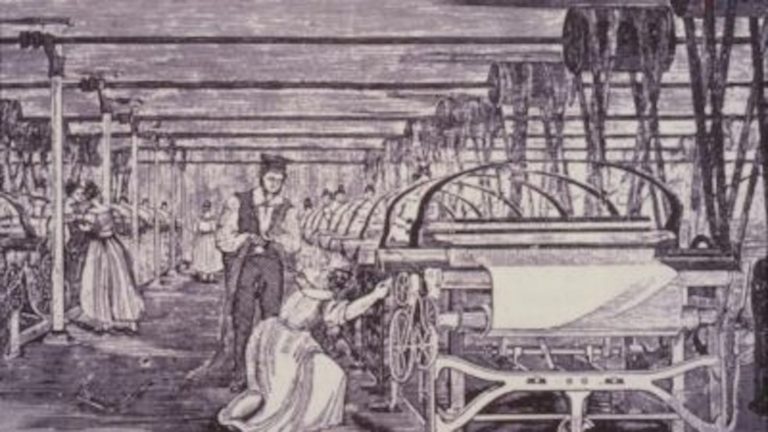












Add comment